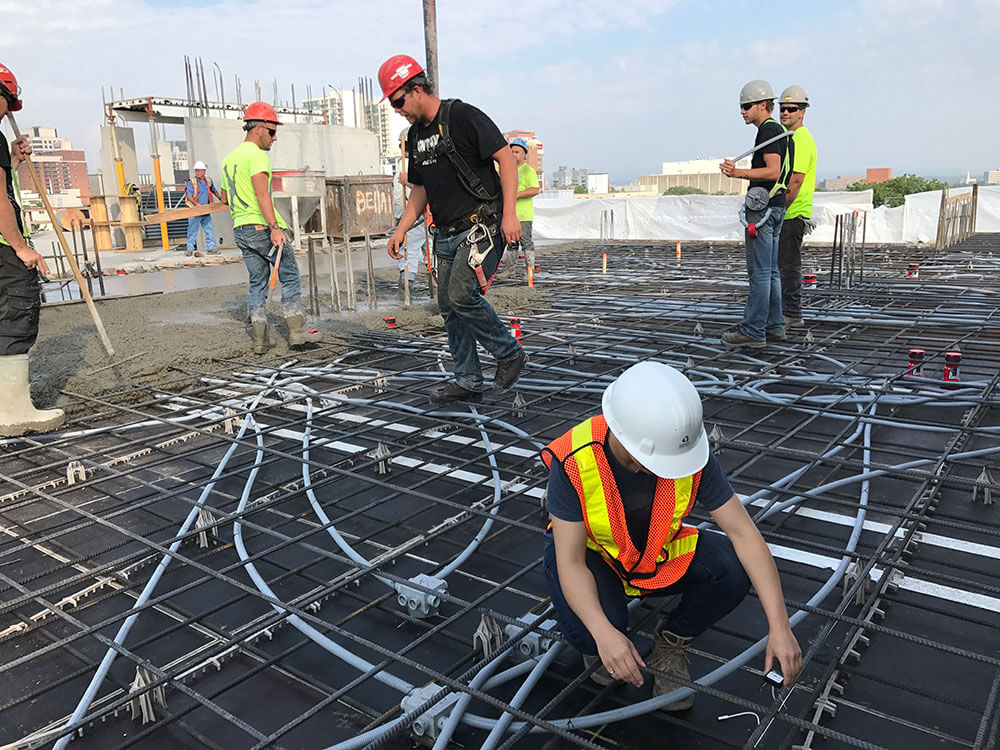Civil engineering is undergoing a rapid transformation. With the demand for smarter infrastructure, sustainable design, and emerging technologies on the rise, the expectations for civil engineers are evolving fast.
Move Data Center Projects Faster
To succeed in this environment, engineers must go beyond technical know-how. They need to master digital tools, adapt to change, and take leadership roles in reshaping the built world.
In this blog, we’ll explore the top high-paying civil engineering careers in 2025, the essential skills needed to attain these roles, and how emerging trends like artificial intelligence (AI) are reshaping the industry’s future. Whether you’re a seasoned engineer or an aspiring professional, these insights will help you navigate the evolving landscape and perhaps fast-track your own civil engineering career success.
Where Civil Engineering Jobs Stand Today
Construction across North America is booming. Public funding from programs like the U.S. Infrastructure Investment and Jobs Act and Canada’s Investing in Canada Plan is fueling major transportation, water, and energy projects.
Job Market Snapshot (2025):
- U.S. job growth (2023–2033): +6%, ~22,900 openings annually (U.S. BLS)
High-Demand Roles Today:
- Project Managers
- BIM/Digital Engineering Managers
- Environmental Engineers
- Geotechnical Engineers
- GIS/Data Engineers
Engineers fluent in green design and digital tools like BIM are seeing a salary boost over traditional roles.
High-Paying Civil Engineering Careers in 2025
Civil engineering offers a wide spectrum of career opportunities, but some roles stand out for their earning potential and impact. These positions not only command high salaries but also offer growth in leadership, specialization, and innovation.
Let’s take a look at a breakdown of the top high-paying roles in 2025 and what makes them so valuable.
| Role | Typical Salary (USD) | Key Skills |
| Project Director | $180K–$230K | Leadership, risk, megaproject delivery |
| Civil Engineering Manager | $127K–$200K | PE license, team & client management |
| Construction Project Manager | $105K–$150K+ | Cost control, scheduling, contracts |
| BIM/Digital Engineering Manager | $100K–$130K+ | Revit, Navisworks, coordination |
| Environmental Engineer | $95K–$130K | LEED, ESG compliance, water systems |
| Geotechnical Engineer | $100K–$128K | Soil analysis, foundations, seismic zones |
| Water Resources Engineer | $100K–$126K | Stormwater, hydraulic modeling |
| Consulting Engineer | $96K–$126K | Specialized advisory, legal reports |
| Structural Analysis Engineer | $114K–$158K | ETABS, SAP2000, simulation modeling |
| Resident Engineer | $85K–$110K | Field execution, coordination, QA/QC |
| Stress Analyst / Engineer | $135K–$150K | Simulation, fatigue modeling, FEA tools |
These roles highlight how specialization, leadership, and digital fluency can significantly elevate earning potential. Civil engineers who invest in continuous learning and certifications, while staying at the forefront of technology, are well-positioned to step into these high-value careers.
Improve your leadership with our essential strategies for construction management! Read more
Top Skills That Pay Off in Civil Engineering
Securing a high-paying job in civil engineering today takes experience and the right mix of skills. Top engineers know their field well, but they also lead teams, use smart tools, and adapt quickly.
Here are the key skills that will help civil engineers succeed in 2025 and beyond:

1. Strong Technical Foundations
Civil engineers must understand the core of their profession: structural mechanics, soil behavior, fluid dynamics, safety codes (AASHTO, ACI, CSA), and material science. Those who specialize—in seismic design, tunneling, or geotechnical systems—are commanding premium salaries.
2. Engineering Software & BIM Proficiency
From AutoCAD to Navisworks, engineers who leverage digital platforms can save time, reduce errors, and accelerate workflows. Common tools include:
- Civil 3D, Revit, SAP2000, ETABS
- BIM 360, ArcGIS, QGIS
Proficiency in BIM and 3D modeling is one of the most requested job requirements.
3. Project Management & Leadership
Leadership roles are key to high compensation. Skills in scheduling (Primavera P6, MS Project), budgeting, risk management, and contractor coordination are in high demand.
PMPs, Lean Construction experts, and seasoned Project Directors ($180K–$230K) are leading complex megaprojects.
4. Communication & Collaboration
Today’s engineers interface with diverse stakeholders. From reports and regulatory compliance to contractor meetings, soft skills matter. Clear communication minimizes rework and improves client outcomes.
5. Sustainability & Environmental Expertise
Climate adaptation and ESG compliance are central to modern civil projects. Skills include:
- LEED or Envision credentials
- Life cycle analysis, stormwater design
- Environmental law and permitting
Engineers with green skills often earn 10–15% more and are top candidates for future-focused infrastructure work.
6. Data, AI, and Smart Tech Fluency
AI and IoT are reshaping workflows. In-demand tools include:
- AI-driven design tools and digital twins
- Power BI, Python, scripting in Excel
Engineers fluent in green design and digital tools like BIM are seeing a salary boost over traditional roles.
7. Adaptability & Lifelong Learning
According to Deloitte, nearly half of infrastructure job skillsets will change within five years. Engineers must embrace continuous upskilling:
- Certifications in BIM, sustainability, AI
- Exposure to modular, 3D printing, and off-site methods
- Networking via ASCE, CSCE, and industry conferences
Engineers who rotate through office, field, and client-facing roles build the most resilience—and the most promotability.
The Tech Edge: AI, Sensors, and Smart Infrastructure
Civil engineers who lead digital transformation stand out. AI-powered mix management platforms, smart sensors, drone inspections, and predictive analytics are not replacing engineers; they’re empowering them.
- AI-powered design tools: These help engineers test many options fast, saving time and money.
- Digital twins: These are virtual models of buildings or systems that help teams plan, monitor, and improve over time.
- Smart concrete monitoring sensors like Giatec’s SmartRock®: These give real-time data on concrete strength and help teams make faster decisions.
- Predictive maintenance: Big data helps teams spot problems before they happen—saving on repairs.
- Drones and mobile tools: These help track progress, inspect work, and keep teams connected from anywhere.
These tools won’t replace civil engineers, but they will change who leads the way. Engineers who can understand and use smart tech will be more valuable than ever.
Hybrid roles are emerging:
- Digital Engineer: Manages BIM models, coordinates digital workflows
- Automation Specialist: Builds scripts for estimating and analysis
- Asset Management Engineer: Uses IoT to forecast maintenance
- Civil Data Analyst: Interprets geospatial, BIM, and IoT data to inform planning
- Stress Engineer: Performs advanced analysis to optimize safety and materials
Interested in learning more about technological innovations in the industry? Check out our Construction Insights!
Move Data Center Projects Faster
Why These Skills and Roles Are Future-Proof
The roles and skills above meet four key criteria:
| Attribute | Why It Matters |
| Digitally enabled | Speeds up workflows, reduces error |
| Sustainability-aligned | Required by law, investors, and global goals |
| Cross-functional | Allows collaboration across teams and tools |
| Adaptable | Can scale with new technology and delivery modes |
These aren’t just “nice to have” traits, they’re strategic necessities. Firms that hire and develop talent with these qualities will outpace competitors on cost, quality, and speed.
Essential Skills in Civil Engineering and Why They Matter
To thrive in today’s evolving infrastructure landscape, civil engineers must cultivate a mix of core competencies and future-ready capabilities. The table below outlines the most critical skills and why they are essential to long-term success and advancement:
| Skill | Why It Matters |
| Technical Foundations | Core to structural integrity, safety, and code compliance across all project types |
| Engineering Software & BIM | Drives efficiency, collaboration, and real-time coordination in digital workflows |
| Project Management & Leadership | Enables delivery of complex projects on time, within budget, and with clear direction |
| Communication & Collaboration | Ensures stakeholder alignment, reduces errors, and improves design outcomes |
| Sustainability & ESG Literacy | Essential for compliance, green certifications, and future-ready infrastructure |
| Data & AI Fluency | Supports predictive decision-making, smart material use, and faster project cycles |
| Lifelong Learning & Adaptability | Prepares engineers to lead through change, embrace innovation, and stay relevant |
In a competitive and rapidly evolving field, these skills are not just nice-to-haves—they are the foundation of a resilient and high-impact engineering career.
Conclusion
Civil engineering is entering a new era. Cities are growing. Climate challenges are real. And technology is moving fast.
To keep up, engineers—and the companies they work for—need to focus on the right skills. That means:
- Learning how to lead
- Using digital tools
- Building greener, smarter systems
- Adapting to change
Whether you’re growing your team or your own career, now is the time to act.
Ultimately, by blending your engineering expertise with continuous learning and a willingness to embrace change, you can fast-track your civil engineering career and help construct a smarter, more sustainable world in the process. The opportunities are out there; it’s an exciting time to be a civil engineer!
Looking for insights into the construction labor shortage? Check out our guide today!






